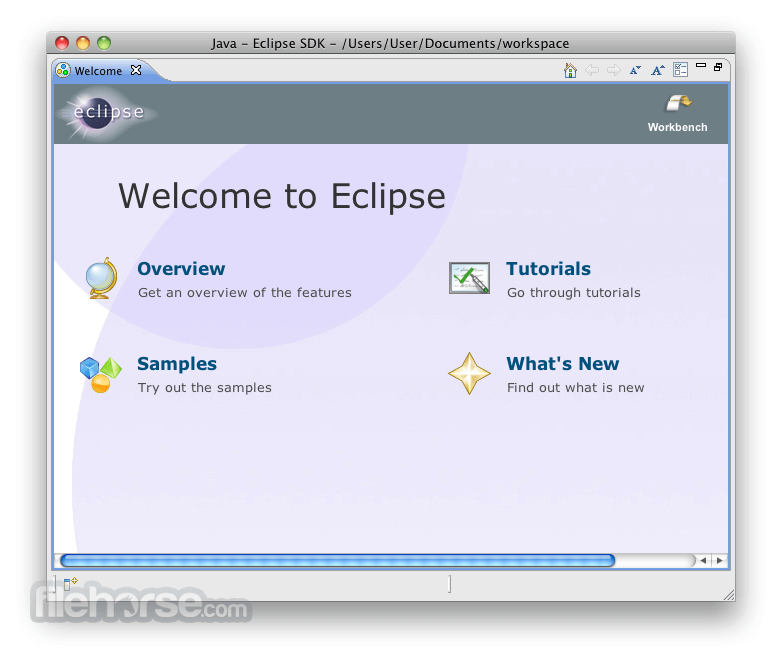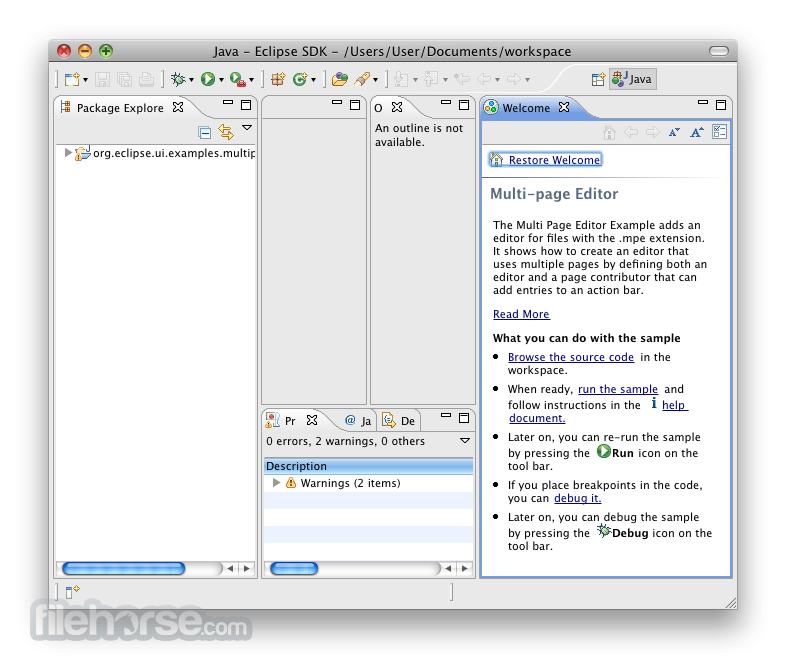-
Latest Version
-
Operating System
Mac OS X 10.5 or later
-
User Rating
Click to vote -
Author / Product
-
Filename
eclipse-SDK-4.30-macosx-cocoa-x86_64.dmg
Sometimes latest versions of the software can cause issues when installed on older devices or devices running an older version of the operating system.
Software makers usually fix these issues but it can take them some time. What you can do in the meantime is to download and install an older version of Eclipse SDK 4.30.
For those interested in downloading the most recent release of Eclipse SDK for Mac or reading our review, simply click here.
All old versions distributed on our website are completely virus-free and available for download at no cost.
We would love to hear from you
If you have any questions or ideas that you want to share with us - head over to our Contact page and let us know. We value your feedback!
What's new in this version:
New features in the Platform and Equinox:
Security:
- p2 Director Application Security To provide similar security controls as available in the IDE, the following command-line arguments are now supported the p2 director application:
- -trustSignedContentOnly | -tsco
- Whether to trust each artifact only if it is jar-signed or PGP-signed.
- -trustedAuthorities | -ta <comma separated list>
- The authorities from which repository content, including repository metadata, is trusted. An empty value will reject all remote connections.
- -trustedPGPKeys | -tk <comma separated list>
- The fingerprints of PGP keys to trust as signers of artifacts. An empty value will reject all PGP keys.
- -trustedCertificates | -tc <comma separated list>
- The SHA-256 'fingerprints' of unanchored certificates to trust as signers of artifacts. An empty value will reject all unanchored certificates.
- -verboseTrust | -vt
- Whether to print detailed information about the content trust.
General Updates:
Support for Jakarta Annotations by Eclipse E4:
- The Eclipse E4 Platform Dependency Injector now supports annotations from the jakarta.inject and jakarta.annotation package
- Plug-in developers are encouraged to migrate their E4 application model element classes to use for example jakarta.inject.Inject instead of javax.inject.Inject or jakarta.annotation.PostConstruct instead of javax.annotation.PostConstruct. At the moment annotations from both namespaces jakarta and javax are supported.
- The support for annotations from the javax.inject and javax.annotation package is now deprecated and will be removed in a future release, after a deprecation period of at least two years. If it necessary to make a Plug-in compatible with past versions (that don't support jakarta annotations), recent and future versions (that don't support javax annotations) of the E4-Injector, it can be considered to apply the annotations from both namespaces simultaneously and to import the packages from both namespaces only optionally. But this strategy does not work for usages of the javax/jakarta.inject.Provider and should generally be used with caution and be verified in detail for more complex setups.
- The Eclipse SDK itself already has been migrated off these annotations from the javax namespace to the jakarta replacements and therefore does not pull the former into a target-platform anymore. If your application still needs these javax annotations you potentially have to add them explicitly to your target using entries like:
- <unit id="jakarta.inject.jakarta.inject-api" version="1.0.5"/>
- <unit id="jakarta.annotation-api" version="1.3.5"/>
- Counterintuitively the javax annotations are provided by a bundle with the same symbolic name as their jakarta successor but with a 1.x version, while the jakarta successors have a 2.x version. It is therefore necessary to specify the version explicitly since those bundles are not required in their latest version.
New Http Client Backend for p2:
- The ECF backend used by p2 has switched to a new JDK-based provider by default. This provider is implemented using the JDK's built-in java.net.http.HttpClient, significantly reducing the number of third-party library dependencies.
- To ease the transition, Eclipse ships both the newer JDK-based backend as well as older the Apache-based backend. The JDK-based backend takes precedence. If you encounter networking issues when installing or updating, particularly with regard to network access via a proxy, please proceed as follows:
- Collect as much data as possible, e.g. is a proxy being used, are the sites being contacted password protected, what is your operating system, what is your JDK version, what configuration details about your network makes it unique?
- Open an issue here with a description of the problem along with all the relevant details.
- Consider providing a test-case for p2 to ensure that your use-case is covered now and forever into the future.
Configure your eclipse.ini to add the following JVM option to disable the JDK-based backend:
- -Dorg.eclipse.ecf.provider.filetransfer.excludeContributors=org.eclipse.ecf.provider.filetransfer.httpclientjava
New features for Java developers:
- Java Language Features:
The release notably includes the following Java features:
- JEP 440: Record Patterns
- JEP 441: Pattern Matching for Switch
Java Editor:
Quick Fix to add default case:
- You can use the new Quick Fix (Ctrl+1) to add the missing default case to an enhanced switch statement
Quick Fix to remove default case:
- You can use the new Quick Fix (Ctrl+1) to remove the default case when it is present with unconditional pattern in a switch
Quick Fix to insert break statement:
- You can use the new Quick Fix (Ctrl+1) to insert the break statement when there is an illegal fall-through to a pattern in a switch statement
Cleanup and quick fix to replace deprecated method calls:
A new cleanup has been added to the Source > Clean Up > Source Fixing tab page to replace deprecated method calls with inlined content. Choosing this option will inline the implementation of the deprecated method if and only if:
- The deprecated method has Javadoc that specifies a @deprecated tag which ends with "use {@link ...}" or "replace by {@link ...}"
- The {@link ...} tag refers to a method
- The linked method is actually called in the implementation of the deprecated method
- Methods and fields accessed in the linked method are visible at the location it will be inlined (e.g. using a package private method is ok to call if in same package)
Quick assist to rename constant fields:
- A new quick assist has been added to rename static constant fields to follow a standard syntax using upper-case and underscores rather than camel case. To use: select the constant and click CTRL+1.
JDT Developers:
Pushdown of refactors and proposals to jdt.manipulations:
- A significant amount of code was pushed down from org.eclipse.jdt.ui into org.eclipse.jdt.core.manipulations, specifically most of the proposal and refactor operations. This will allow these operations to be used in a headless environment.
New APIs in the Platform and Equinox:
Platform Changes:
Eclipse Search:
- The org.eclipse.search bundle has been split into core and ui bundles. This will allow headless extenders to make use of the text search engine.
Snapshot API for Undoable operations:
- The org.eclipse.ui.ide.undo package in the org.eclipse.ui.ide bundle has been migrated into the core platform and is now available in the org.eclipse.core.resources.undo.snapshot package and it's internal counterpart. This has allowed JDT to move significant portions of their refactor and proposal logic into bundles more suited to a headless environment.
New features for plug-in developers:
Editors:
Support for names of product update repositories:
- The PDE Product Editor now supports in its Updates section to specify the Name of each update repository. In the assembled product the names will be presented to a user in the preferences under Available Software Sites.
Removed support for unnecessary attributes in Features and Products:
The Feature editor has its support for the following attributes of plugin elements removed:
- download-size
- install-size
- unpack
- fragment
- These attributes are unused and without effect for a long time and unnecessarily increase the complexity of the editor and the size of a feature.xml file. They are ignored when present in an existing Feature and removed by the editor upon the next modification through the editor.
- The Product Configuration editor has its support for the following attribute of plugin elements removed: fragment. This attribute is unused and without effect for a long time and unnecessarily increase the size of a .product file. They are ignored when present in an existing Product and removed by the editor upon the next modification through the editor.
 OperaOpera 120.0 Build 5543.38
OperaOpera 120.0 Build 5543.38 PhotoshopAdobe Photoshop CC 2024 25.12
PhotoshopAdobe Photoshop CC 2024 25.12 CapCutCapCut 6.5.0
CapCutCapCut 6.5.0 BlueStacksBlueStacks Air 5.21.650
BlueStacksBlueStacks Air 5.21.650 Adobe AcrobatAdobe Acrobat Pro 2025.001.20529
Adobe AcrobatAdobe Acrobat Pro 2025.001.20529 MacKeeperMacKeeper 7.0
MacKeeperMacKeeper 7.0 Hero WarsHero Wars - Online Action Game
Hero WarsHero Wars - Online Action Game SemrushSemrush - Keyword Research Tool
SemrushSemrush - Keyword Research Tool CleanMyMacCleanMyMac X 5.0.6
CleanMyMacCleanMyMac X 5.0.6 4DDiG4DDiG Mac Data Recovery 5.2.2
4DDiG4DDiG Mac Data Recovery 5.2.2










Comments and User Reviews